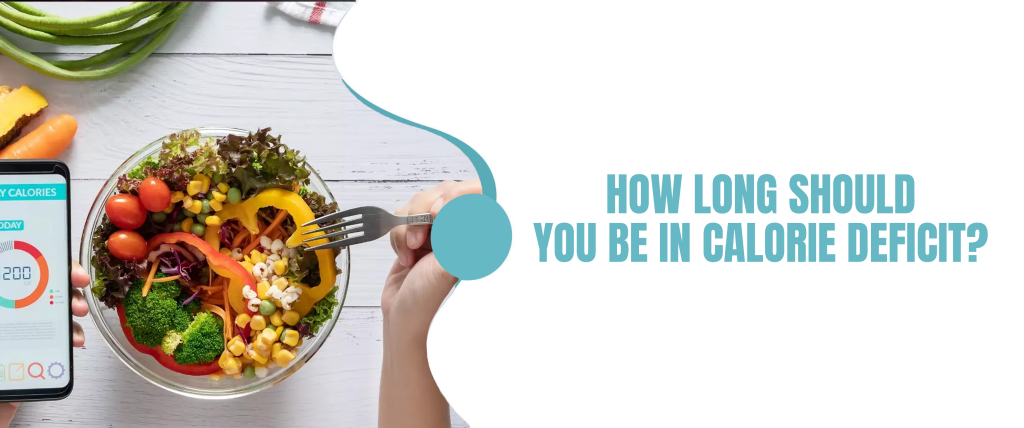|
Getting your Trinity Audio player ready...
|
Reviewed by: Dr. Sadie Wegler
Fact Checked by: Dr. Jordan Wheeler Kincaid

In this article, we have discussed how long should you be in Calorie Deficit and a few other aspects related to it.
A calorie deficit is one of the most effective weight loss practices many people practice to get their bodies into better shape.
While most people know how they should go about during the calorie deficit process, they tend to need clarification about how long the process should continue. Now, the time you’re contributing towards calorie deficit plays a significant role in your body.
In general, it’s best to eat in deficit for no more than 6 to 12 weeks before switching to a maintenance diet for a while. Read along to understand better what this article has in store for you!
How Long Should You Be In Calorie Deficit?
Doing a calorie deficit does not have a specific stopwatch or timer for when you should start or stop following it.
Calorie deficit and weight loss are subjective terms and vary from person to person. However, it is a vital fact that the experts have concluded that a rate of weight loss of about 0.5 kg to 1 kg a week can be a standard measuring point for weight loss.
Keeping this value in mind, you need to work accordingly. You need to have a proper chalked-out idea of a few parameters, like,
- Your present body weight,
- Amount of fat contained in your body at present, and
- The desired amount of fat you wish to achieve.
And that’s where 60% of your job is done. Now, all you got to do is perform a rough calculation of the amount of body fat needed to be reduced and get an idea of how long the process could take (referring to the expert’s advice of considering 0.5 kg to 1 kg fat loss a week).
If you can clearly outline this data, you shall get clarity and knowledge of how long your calorie deficit journey should be. All you need to do is have a clear goal and know what you’re doing. Believe in the process, and stick to it; that’s the hack!
So, the next time someone asks you about your calorie deficit process, make them understand well that their period for the deficit might not be the same as yours; instead, it might vary vastly!
Can You Lose Muscle If You Stay On Calorie Deficit For Long?

If you’re thinking of gaining subsequent loss in your overall muscle by being in a calorie deficit for quite some time, then you are right about it! The longer you remain in a calorie deficit, the more your body will use the already stored fat while no calorie input takes place.
You must know that your body always wants to retain at least a little fat. So, if you continue to stay on a calorie-deficit diet for a prolonged period, you shall eventually burn muscles besides fat.
Regardless of your age or occupation, you need to know that you should look out for not losing a significant amount of fat while already being in a deficit. Holding on to as much muscle as possible has its own benefits, and one shall surely cherish them.
Here are some reasons why holding on to your muscles can be necessary for you.
- Having the right amount of muscles can give you a better look than usual. Muscles can give you the desired shape of the body.
- The muscles you have shared a direct proportionality with the metabolism you own. It indicates that you shall be able to consume more calories for having control over losing or gaining weight, and we feel that’s magical.
- Having more muscles have helped sportspersons become faster at their game and be able to play in a more robust and better way at that.
- The last benefit is a known one that is having more muscles is going to make you even more potent and make your daily work more simplified for you.
Thus, the next time you start your calorie deficit journey, be assured of how long you are doing that and what your final goals are.
Is It Okay To Take A Break From Calorie Deficit?
Even though it’s an unpopular opinion, taking diet breaks is beneficial for sticking to a dietary routine for some time to get the maximum results. The theory behind this has got both physiological as well as psychological advantages to serve.
In case you are unaware of a diet break, it is a pre-planned period in which you can take a short break from the entire process of calorie deficit. During this span, the only thing you should keep in mind is to stick by the current weight you have before starting off with the course.
Taking some breaks can help you get better at it even more by being able to eat a bit more or work harder at the gym or even relax for some time. Following the same schedule can make the entire process monotonous and sometimes even urge you to give up on it.
From the physiological point of view, taking diet breaks regularly can help you maintain better health by eliminating the process’s unwanted adverse effects.
Thus, not only taking breaks during your calorie deficit journey is fine, but it is also highly recommended for fetching the best results.
Are There Any Health Risks For Maintaining Calorie Deficits For Long?

Staying on a calorie deficit for more extended periods might pose harm to your body, which works both at a mental as well as physical level. Here’s how.
Impact Of Prolonged Calorie Deficit On Physical Health
As we have previously discussed, having a calorie deficit for a prolonged period can land you serious health risks, and you may lose muscle mass from your body.
Muscle mass can add to your overall looks and offer you enough strength and metabolism to get through the day.
Therefore, stay assured of how long you continue your calorie deficit process.
Impact Of Prolonged Calorie Deficit On Mental Health
When one stays on a diet or calorie deficit, they tend to avoid junk or unhealthy food. These situations lead them to avoid social gatherings or parties where food is a significant factor. Doing this for a long time leads to feeling left out from others and drains them mentally.
Furthermore, having the same dietary schedule for months can be tiring for your mind and body, which might impact your mental health and behavioral patterns.
Therefore, holding on to a specific calorie deficit for a long time can be a draining fact for most of you.
Conclusion
So how long should you be in calorie deficit? Having the right idea about calorie deficit and its various aspects is essential for being assured of being on the right track while you’re at it. Do not overstress yourself thinking of the possibilities and outcomes the journey could provide you with.
Focus on the path, believe in yourself, and adhere to the needful. That’s it; you’re pretty good to go!
- Debunking Myths About Storage Body Fat - May 2, 2024
- Is Fiji Water Good for You – Health and Environmental Guide - April 22, 2024
- Is Sparkling Ice Good for You? Health Insights Revealed - April 22, 2024
